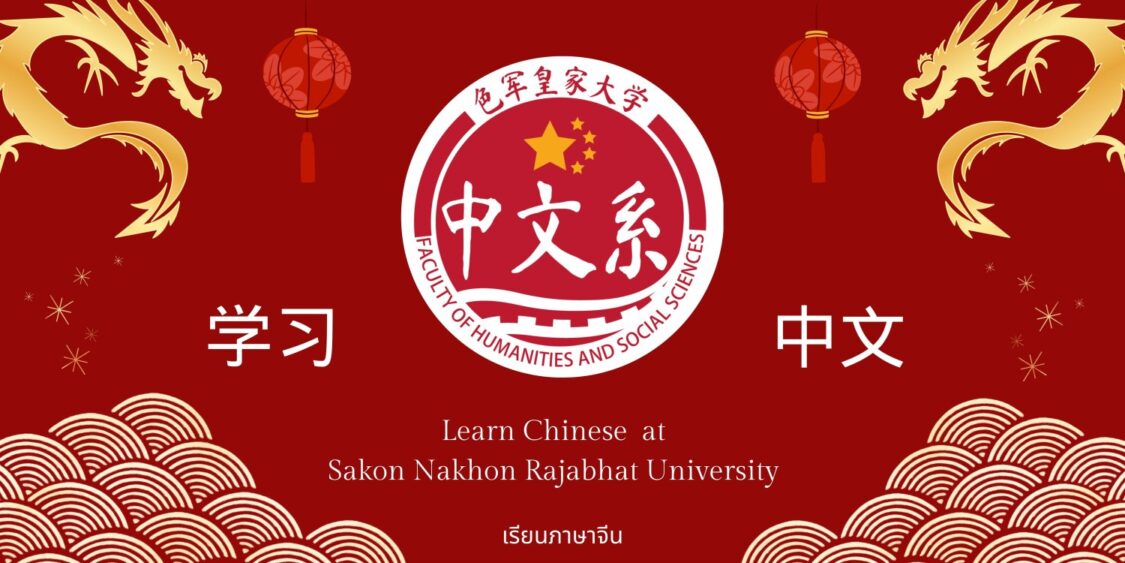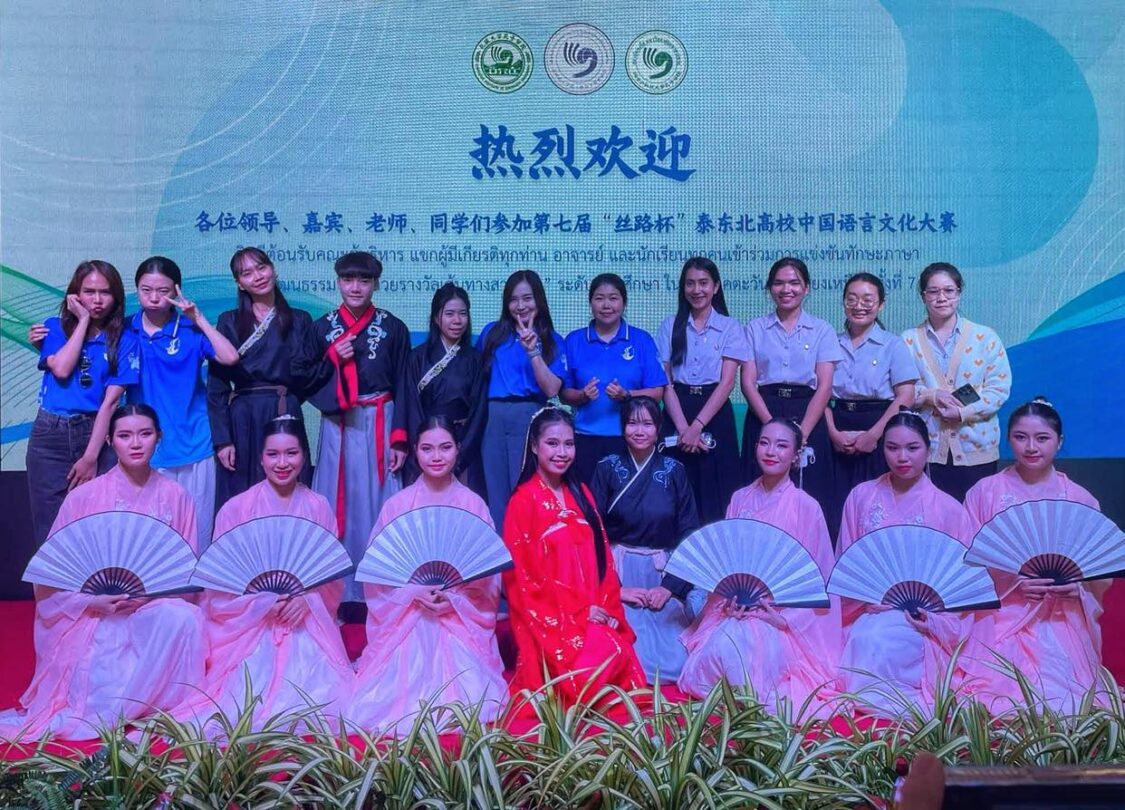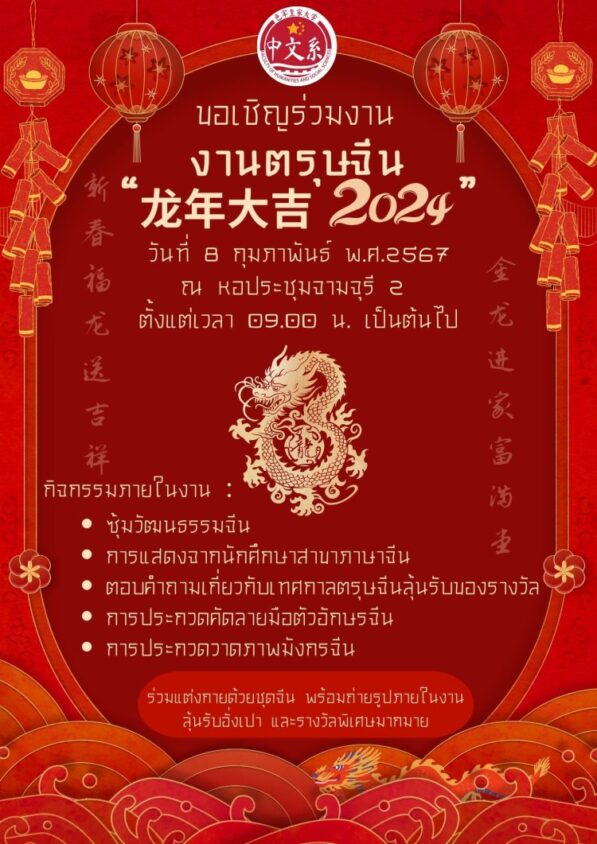Learn Chinese in Thailand – University Programs

In addition to two English programs, Sakon Nakhon Rajabhat University (SNRU) has a flourishing Chinese Language Program (Bachelors of Arts), which is adding a Master’s degree program in 2025.
With its vibrant Chinatown area, whose residents have recently built a magnificent Chinese Buddhist temple at the Metta Dharma Foundation Courtyard, Sakon Nakhon is becoming one of the best places in Northeast Thailand to study Chinese.
With small classes and a faculty of Chinese language teachers who have studied in China (along with visiting lecturers from China), the Thai students of the SNRU Chinese Major Program receive excellent, hands-on instruction, and take part of Chinese cultural activities throughout the year.
For example, every year SNRU Chinese language students take part in the “Silk Road Cup” — 丝路杯 – ถ้วยรางวัลเส้นทางสายไหม — a Chinese Language and Culture Competition of Northeastern Thailand universities, now in its 8th year, which includes Chinese dance performances, poetry recitals, and knowledge quizzes. The program has also sent students to China to participate in international speech contests.

History of Chinese Language Programs in Thailand
In recent years, more and more Thai students are choosing to study Chinese at university, and it’s easy to see why. With China playing such a big role in Thailand’s economy and culture, learning Mandarin has become a smart move for anyone looking to get ahead. While English has always been the top foreign language in schools, Mandarin is quickly catching up as students start to see how useful it can be for their future careers and lives.
There are a few big reasons why Chinese language programs are growing so fast. First, China is Thailand’s biggest trading partner, so businesses need people who can speak Mandarin. Universities are jumping on this trend by offering programs that focus on practical skills, like business communication.
On top of that, many Thai people have Chinese heritage, so learning Mandarin feels like a way to reconnect with their roots. Chinese TV shows, movies, and music have also become super popular with younger people, which has made the language even more appealing.
Another major factor is the support from China itself. The Chinese government and organizations like the Confucius Institute are offering scholarships, exchange programs, and other opportunities to help Thai students study Mandarin.
Thanks to this support, learning Chinese is now more accessible than ever, not only at Thai universities but also high schools (Matthayom), as well. Thai students see it as a way to stand out in fields like tourism, trade, education, and even diplomacy. With China’s growing influence, speaking Mandarin can give Thai graduates a major advantage in the job market.
Of course, English isn’t going anywhere. It’s still the go-to language for international communication, and it’s taught widely across Thailand. But Chinese is now seen as a strategic skill for careers closer to home.
Universities in Thailand are expanding their Chinese programs, offering degrees in Chinese language, business Mandarin, and even Chinese communication. Many of these programs also include opportunities to study abroad in China, which helps students learn faster and experience the culture firsthand.

Is English or Chinese Harder for Thais to Learn?
When it comes to learning Chinese versus English, each language has its challenges. English pronunciation can be tricky for Thais because it has sounds like “v” and “z” and “th” that don’t exist in Thai. On the other hand, Chinese uses tones, which might sound difficult at first but are actually easier for Thais to pick up since Thai is also a tonal language.
Grammar is another story. English has tenses, irregular verbs, and subject-verb agreement, which can confuse Thai learners. Chinese grammar is simpler in some ways — there are no verb conjugations or plural forms — but mastering sentence structure and particles still takes work.
Writing is where the two languages really stand apart. English uses a simple 26-letter alphabet, although its inconsistent spelling can be frustrating (to put it mildly!). Mandarin, meanwhile, uses characters (or “hanzi“) that require a lot of memorization and practice. This is often the hardest part of learning Chinese, but it’s also what makes the language so unique — and many Thais enjoy the artistic nature of making the Chinese character strokes.
Another factor is exposure. English is everywhere — in movies, music, technology, and schools — so Thai students grow up surrounded by it. Mandarin is less common, but that’s starting to change. Thanks to Chinese media, Tik Tok videos, and study-abroad programs, students now have more chances to immerse themselves in the language.
The growing interest in Chinese reflects how Thailand’s economy and culture are evolving. English is still essential for global opportunities, but Mandarin is becoming a must-have skill for careers in Asia. Many students are now choosing to learn both languages, giving themselves the best of both worlds. As Chinese programs continue to expand, they’re opening up exciting new opportunities for Thai students in a region that’s changing fast.
Students interested in learning more about the Bachelor’s and Master’s Degree programs in Chinese at Sakon Nakhon Rakabhat University should visit their Facebook page and, for more information, message their staff.
- Affirmations in Buddhism & Thailand - June 7, 2025
- Speak Thai Naturally Without the Gymnastics - April 20, 2025
- The Best Learn Thai Podcast and YouTube Channel - April 10, 2025




